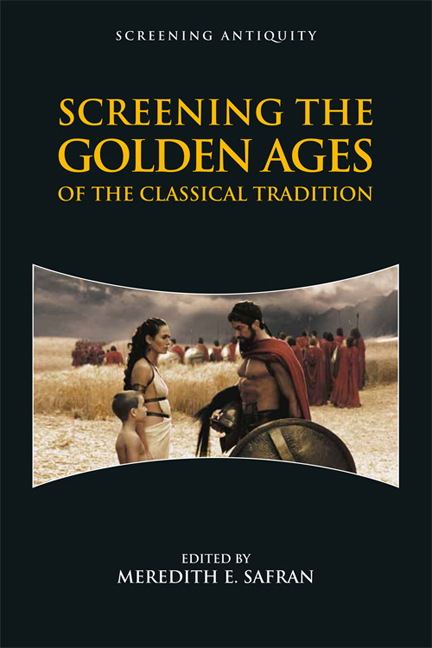Book contents
- Frontmatter
- Contents
- Series Editors’ Preface
- Editor's Acknowledgments
- Contributors
- Illustrations
- Abbreviations
- Introduction: Searching for Gold in an Age of Iron
- PART I THE GLORY THAT WAS GREECE
- PART II THE GRANDEUR THAT WAS ROME
- 8 “All That Glitters …”: Problematizing Golden-Age Narratives in Vergil's Aeneid and the Western Film Genre
- 9 The Golden Age and Imperial Dominance in the Aeneid and Serenity (2005)
- 10 Turning Gold into Lead: Sexual Pathology and the De-mythologizing of Augustus in HBO's Rome (2005–2007)
- 11 The Dux Femina Ends Westeros’ Golden Age: Cersei Lannister as Agrippina the Younger in HBO's Game of Thrones (2011–)
- 12 The Golden Aspects of Roman Imperialism in Film, 1914–2015
- 13 Broken Eagles: The Iron Age of Imperial Roman Warfare in Post-9/11 Film
- 14 Dreaming of Rome with Ridley Scott's Gladiator (2000)
- Filmography
- Bibliography
- Index
10 - Turning Gold into Lead: Sexual Pathology and the De-mythologizing of Augustus in HBO's Rome (2005–2007)
from PART II - THE GRANDEUR THAT WAS ROME
Published online by Cambridge University Press: 23 November 2019
- Frontmatter
- Contents
- Series Editors’ Preface
- Editor's Acknowledgments
- Contributors
- Illustrations
- Abbreviations
- Introduction: Searching for Gold in an Age of Iron
- PART I THE GLORY THAT WAS GREECE
- PART II THE GRANDEUR THAT WAS ROME
- 8 “All That Glitters …”: Problematizing Golden-Age Narratives in Vergil's Aeneid and the Western Film Genre
- 9 The Golden Age and Imperial Dominance in the Aeneid and Serenity (2005)
- 10 Turning Gold into Lead: Sexual Pathology and the De-mythologizing of Augustus in HBO's Rome (2005–2007)
- 11 The Dux Femina Ends Westeros’ Golden Age: Cersei Lannister as Agrippina the Younger in HBO's Game of Thrones (2011–)
- 12 The Golden Aspects of Roman Imperialism in Film, 1914–2015
- 13 Broken Eagles: The Iron Age of Imperial Roman Warfare in Post-9/11 Film
- 14 Dreaming of Rome with Ridley Scott's Gladiator (2000)
- Filmography
- Bibliography
- Index
Summary
He transformed the Roman Republic into the Principate. He was hailed by his contemporaries as the harbinger of a new golden age of civil and political stability, reinforced by a return to appropriate gender and sexual mores. At the same time, in the popular imagination he remains something of an enigma, for the presence of the first Roman emperor within popular film and television has not been as pronounced as that of his successors Caligula, Claudius, and Nero. He was, of course, Augustus. Despite his prominence within ancient Roman history, he remains shrouded behind what Barbara Weiden Boyd has characterized as “The Augustan mask, in all its impenetrability and ominous power.” This mask has largely kept him from accruing the vexed aura that has attached itself to other imperial figures. When he does appear, as in the 1976 TV series I, Claudius (played by Brian Blessed) or in the 2003 TV film Imperium: Augustus (played by Peter O'Toole), he is typically depicted as an older statesman, long after the man and the myth had fused – but what of his formative years, before Octavian became Augustus?
HBO's Rome brings to the screen arguably the most fully fleshed depiction of the psychological development of this seminal figure. The series interprets Octavian in relation to his viciously sexual mother Atia and his variably timid and rebellious sister Octavia, and as the protégé of two of the Republic's leading men, Julius Caesar and Marc Antony. Although he begins the series in thrall to Atia and Antony, he gradually establishes control: first over himself, and then over everyone around him. Through his nuanced understanding of the workings of both politics and personal foibles, Octavian manages to seize control of the Republic and usher in a new regime. Whether it is the “golden” one proclaimed by poets and accepted by the classical tradition is up for debate.
Through two seasons, Rome mirrors this personal maturation in its chronicling of the decline and fall of the Roman Republic and the gradual emergence of the Principate under the undisputed leadership of the young Octavian, in his newly minted identity as Augustus.
- Type
- Chapter
- Information
- Screening the Golden Ages of the Classical Tradition , pp. 191 - 206Publisher: Edinburgh University PressPrint publication year: 2018



